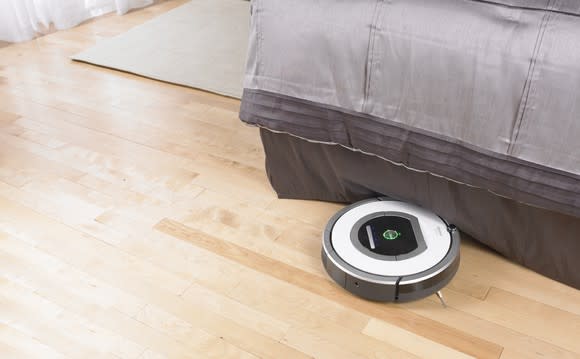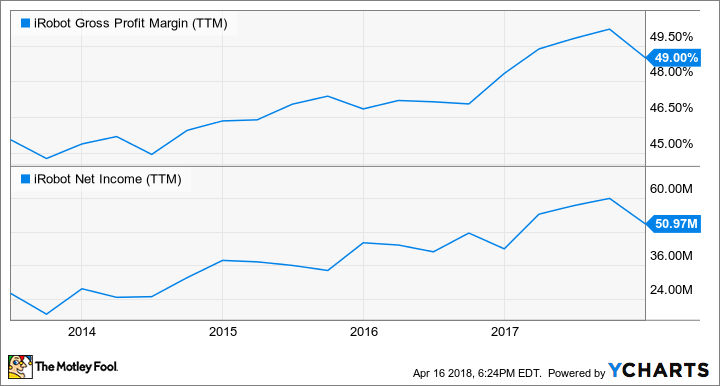Is iRobot Corporation (IRBT) a Buy?
Sophisticated robots have long been a dream in science fiction, but there are some robots making life easier for consumers today. iRobot Corporation (NASDAQ: IRBT) is the leading designer of robotic vacuum cleaners (RVCs), and it's improving its products to be both more effective and smarter in the home.
The question for investors is: Are vacuum-cleaning robots worth investing in? It may not seem like the kind of product investors should be excited about, but investing in robotic vacuums may be a smarter move than you think.

Image source: Roomba.
Dominating robotic vacuum cleaners
The iRobot name may seem to imply the company makes all kinds of robots, but that's not the case. In reality, the company focuses on RVCs and a few closely related adjacent markets.
The technology that separates iRobot in RVCs from competitors like Dyson, Samsung, and Hoover is its sensing and mapping technology. Roombas simply perform better than their competitors, and that allows iRobot to spread its research and development (R&D) spending across more devices, which ultimately leads to higher profits. And the fact that it has greater scale in RVCs lowers costs as well. The leverage dynamic can be seen below, with gross margin and net income both on the rise over the last five years. It's tough to gauge whether or not competitors are seeing higher margins because they're either private (Dyson) or vacuums are a small portion of sales (Samsung), but iRobot's trends indicate a strong position in the market.
IRBT Gross Profit Margin (TTM) data by YCharts.
iRobot is still just scratching the surface of its potential, as RVCs account for just 23% of the $7.5 billion vacuum cleaner market worldwide. But the share of the market RVCs represents is up from 13% in 2012, and iRobot controls 62% of the RVC market, so it's well-positioned to ride growth in its core market.
Not only is the Roomba brand growing, but iRobot is using some of the same technology from its vacuums to expand into new products that could drive sustainable growth for the long term.
Growing where it makes sense
In the last few years, iRobot has focused its business on areas it has a technology advantage. I mentioned that Roomba can leverage R&D spending across a larger number of sales than competitors can, and iRobot is bringing the same basic technology to mopping and pool cleaning. In these markets it doesn't have to invent new technology; it simply leverages what it does best in sensing and mapping.
iRobot has also sold products that don't make as much sense in its lineup. In 2016, it agreed to sell its military robot business for $45 million, which wasn't a big financial impact but it helped focus the company on the core technologies it does best.
Where iRobot's value stands
iRobot's management has given guidance for earnings per share of $2.10 to $2.35 in 2018, putting the stock's forward price-to-earnings ratio at 30 at the midpoint. In 2019 and 2020, management expects at least 10% growth, so in the long term this should be a solid growth stock.
At 30 times forward earnings estimates, the stock isn't a steal, but it's a decent price given the expectation for double-digit growth through the end of the decade. I think the stock is a buy today, but if performance or future guidance falls short of expectations, I may reconsider my bullish position.
More From The Motley Fool
Travis Hoium has no position in any of the stocks mentioned. The Motley Fool owns shares of and recommends iRobot. The Motley Fool has a disclosure policy.

